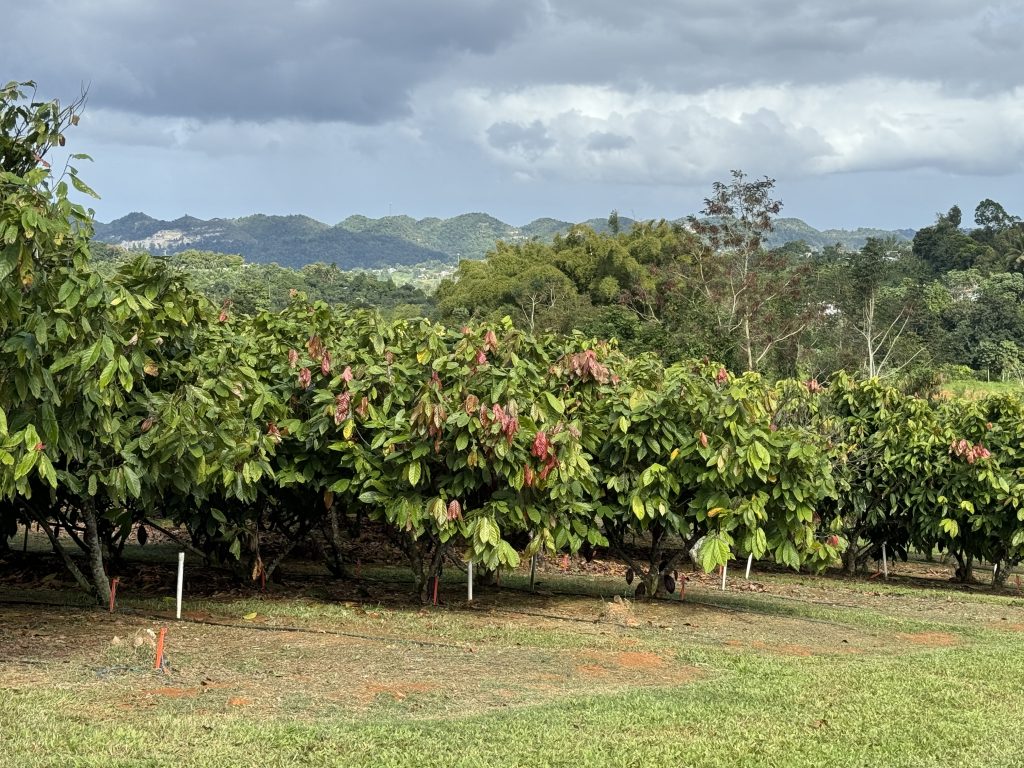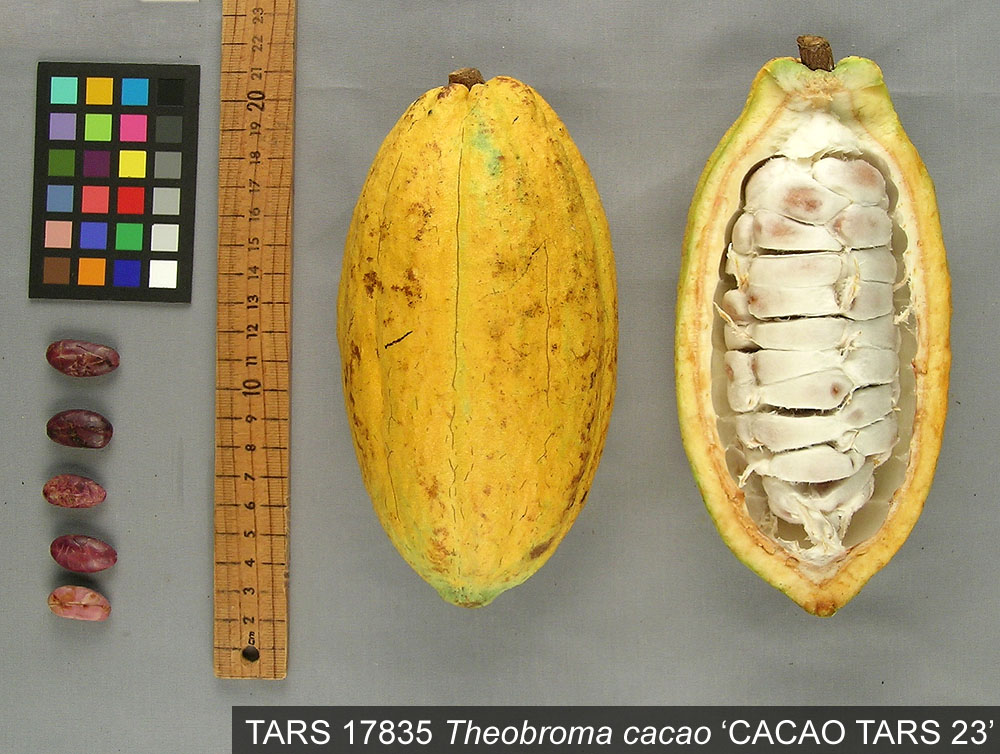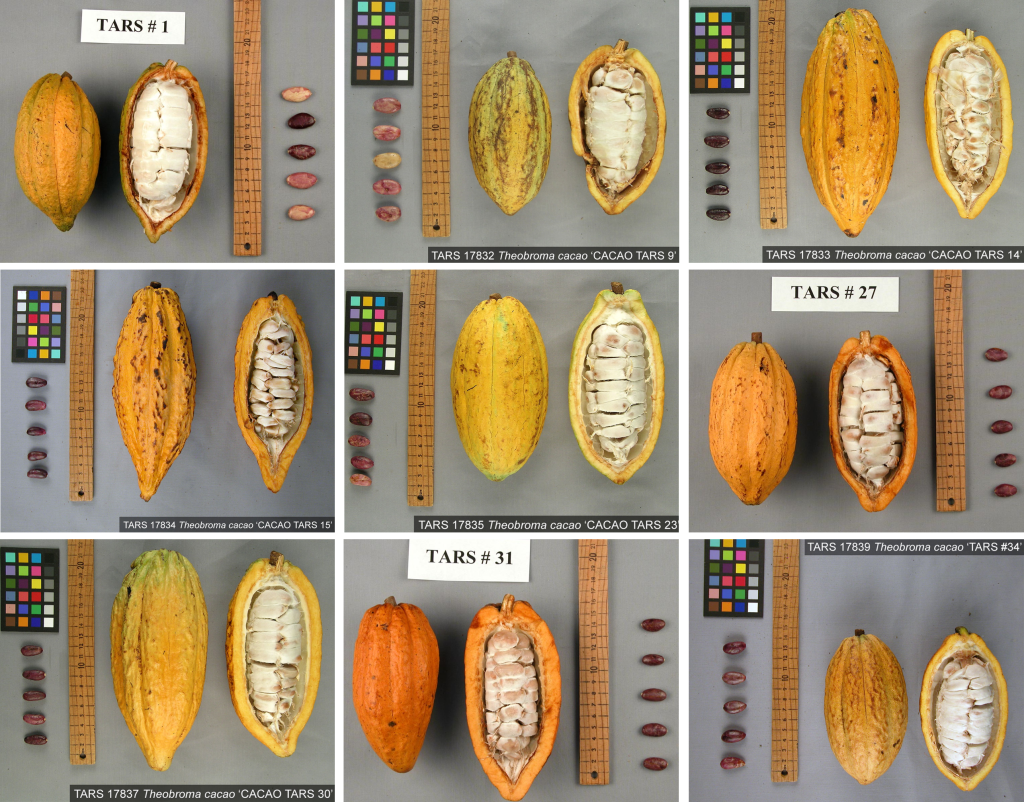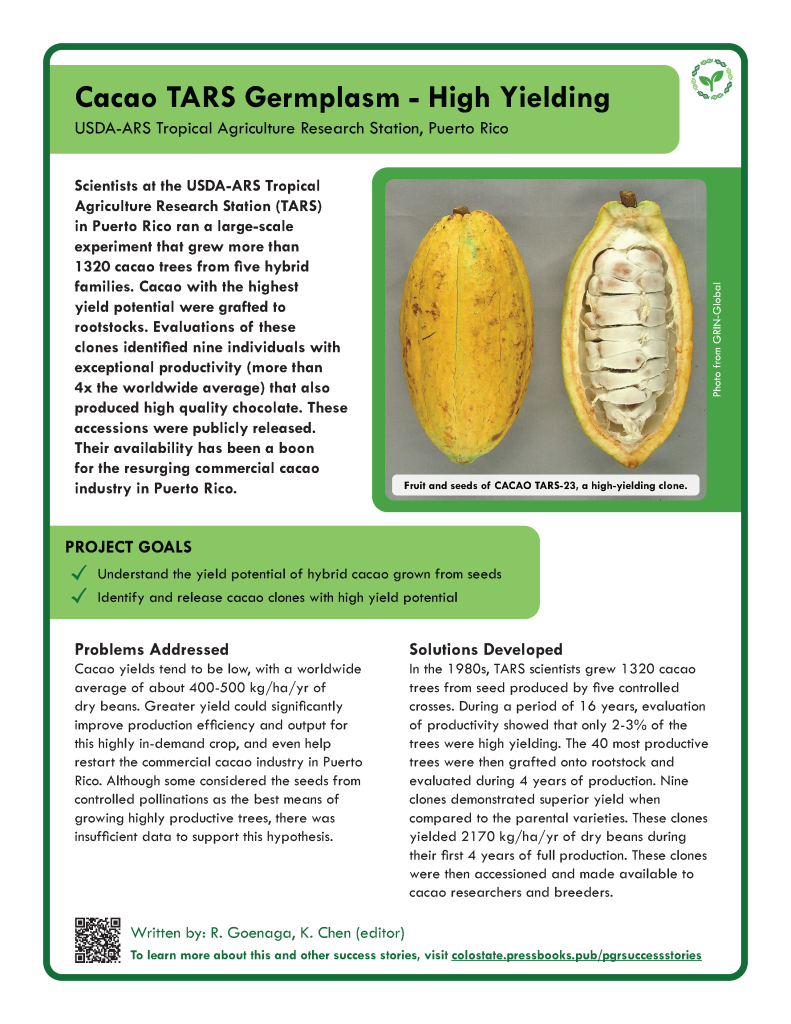Sugars, Starches, and Beverages
Cacao TARS Germplasm – High Yielding
CACAO SELECTIONS FROM THE USDA-ARS ARE NOW IN PRODUCTION AND HAVE WON INTERNATIONAL PRIZES FOR FLAVOR
Ricardo Goenaga
USDA-ARS Tropical Agriculture Research Station, 2200 P.A. Campos Ave, Suite 201, Mayagüez, Puerto Rico 00680.
Corresponding author: r_goenaga@yahoo.com
OUTLINE
1. SUMMARY

Scientists at the USDA-ARS Tropical Agriculture Research Station (TARS) ran a large-scale experiment that grew more than 1320 cacao trees from five hybrid families across three different sites in Puerto Rico. Cacao with the highest yield potential were grafted to rootstocks. Evaluations of these clones identified nine individuals with exceptional productivity (more than 4x the worldwide average) that also produced high quality chocolate. These accessions were publicly released. Their availability has been a boon for the resurging commercial cacao industry in Puerto Rico.
The goals were :
- To understand the yield potential of hybrid cacao grown from seeds
- To identify and release cacao clones with high yield potential
Download a printable fact sheet by clicking the image below.
2. PROBLEMS ADDRESSED
Cacao yields tend to be low, with a worldwide average of about 400-500 kg/ha/yr of dry beans. Greater yield could significantly improve production efficiency and output for this highly in-demand crop, and even help restart the commercial cacao industry in Puerto Rico. Although some considered the seeds from controlled pollinations as the best means of growing highly productive trees, there was insufficient data to support this hypothesis.
3. SOLUTIONS DEVELOPED

In the 1980s, TARS scientists began a large-scale experiment growing cacao (Theobroma cacao L.) from seed produced by five controlled crosses (Irizarry and Rivera, 1998). During a period of 16 years, they evaluated 1320 of these cacao trees for productivity and found that only 2-3% were high yielding. The 40 most productive trees obtained from this experiment were then grafted onto an open-pollinated rootstock (EET-400) and evaluated in a replicated trial under full sunlight and intensive management in Corozal, Puerto Rico during 4 years of production (Irizarry and Goenaga, 2000). Of the 40 clones selected for final evaluation, only nine demonstrated superior yield when compared to either the combined mean of the five parental clones or the mean of their highest yielding parent (Goenaga et al., 2009). These clones yielded 2170 kg/ha/yr of dry beans during their first 4 years of full production. An evaluation of the chocolate produced from these nine selections reported diverse flavor characteristics (Goenaga et al., 2009). Subsequent research by TARS scientists has confirmed that high-yielding performance of these varieties (Goenaga et al., 2015). These clones were then accessioned and made available to cacao researchers and breeders through the National Plant Germplasm System.
Collaborators involved in developing solution:
- Ricardo Goenaga, Heber Irizarry, Brian Irish, and Edmundo Rivera, USDA Tropical Agriculture Research Station, Mayagüez, Puerto Rico
4. IMPACT
When this project began, there were no commercial cacao plantings in Puerto Rico. Following the release of these nine productive accessions, the commercial cacao industry in Puerto Rico was revived and has since grown to cover more than 1000 acres. Puerto Rican cacao growers have even received prestigious awards from the Cacao for Excellence international program in part by growing TARS accessions recognized for their quality and flavor.
To hear more about the cacao comeback in Puerto Rico, listen to this 4-minute NPR segment.
5. GERMPLASM

Eight parental clones were initially crossed to develop five hybrid families: UF-668 x Pound-7, IMC-67 x UF-613, EET-400 x SCA-12, SCA-6 x EET-62, and IMC-67 x SCA-12.
These trials produced nine high yielding selections: CACAO TARS 1 (PI 668451), CACAO TARS 9 (PI 668452), CACAO TARS 14 (PI 668453), CACAO TARS 15 (PI 668454), CACAO TARS 23 (PI 668455), CACAO TARS 27 (PI 668456), CACAO TARS 30 (PI 668457), CACAO TARS 31 (PI 668458), and CACAO TARS 34 (PI 668459).
6. REFERENCES
Goenaga RJ, Guiltinan M, Maximova S, Seguine E, Irrizary H. 2015. Yield performance and bean quality traits of cacao propagated by grafting and somatic embryo-derived cuttings. HortScience 50:358-362. https://doi.org/10.21273/HORTSCI.50.3.358
Goenaga R, Irizarry H, Irish B. 2009. TARS Series of Cacao Germplasm Selections. HortScience 44:826-827. https://doi.org/10.21273/HORTSCI.44.3.826
Irizarry H, Goenaga R. 2000. Clonal selection in cacao based on early yield performance of grafted trees. The Journal of Agriculture of the University of Puerto Rico 84:153-163.
Irizarry H, Rivera E. 1998. Early yield of five cacao families at three locations in Puerto Rico. The Journal of Agriculture of the University of Puerto Rico 82:163-171.
7. CHAPTER INFORMATION
Citation: Goenaga R. 2024. Cacao TARS Germplasm – High Yielding. In: Volk GM, Chen K, Byrne P (Eds.) Plant Genetic Resources: Success Stories. Fort Collins, Colorado: Colorado State University. Date accessed. Available from https://colostate.pressbooks.pub/pgrsuccessstories/chapter/cacao-tars-germplasm-high-yielding/
Content originally submitted: April 10, 2024
Date of publication: August 13, 2024
USDA is an equal opportunity provider, employer, and lender. Mention of trade names or commercial products in this article is solely for the purpose of providing specific information and does not imply recommendation or endorsement by the U.S. Department of Agriculture.


